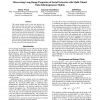Free Online Productivity Tools
i2Speak
i2Symbol
i2OCR
iTex2Img
iWeb2Print
iWeb2Shot
i2Type
iPdf2Split
iPdf2Merge
i2Bopomofo
i2Arabic
i2Style
i2Image
i2PDF
iLatex2Rtf
Sci2ools
AAAI
2010
2010
Discovering Long Range Properties of Social Networks with Multi-Valued Time-Inhomogeneous Models
The current methods used to mine and analyze temporal social network data make two assumptions: all edges have the same strength, and all parameters are time-homogeneous. We show that those assumptions may not hold for social networks and propose an alternative model with two novel aspects: (1) the modeling of edges as multi-valued variables that can change in intensity, and (2) the use of a curved exponential family framework to capture time-inhomogeneous properties while retaining a parsimonious and interpretable model. We show that our model outperforms traditional models on two real-world social network data sets.
| Added | 29 Oct 2010 |
| Updated | 29 Oct 2010 |
| Type | Conference |
| Year | 2010 |
| Where | AAAI |
| Authors | Danny Wyatt, Tanzeem Choudhury, Jeff Bilmes |
Comments (0)

